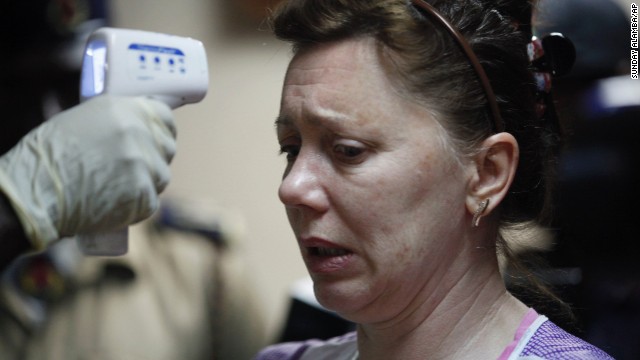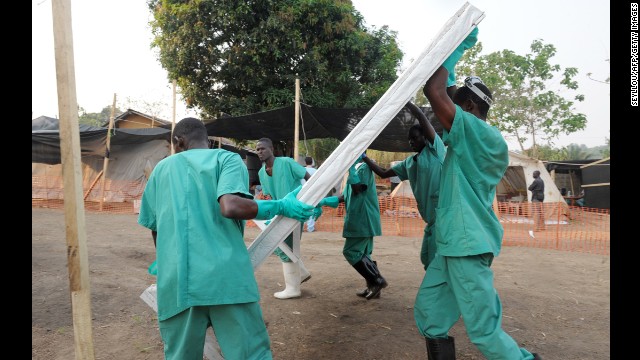Story highlights
- Dr. Kent Brantly went to West Africa to work for a Christian relief organization
- He recalls feeling "a little off" on July 23, then testing positive for Ebola virus
- Brantly says he had "no reserve," didn't know if he could continue breathing
- He did and -- after time at an Atlanta hospital -- was declared symptom-free
Dr. Kent Brantly had stared death in the face many times, doing all he could against frightful odds to save Ebola victims in West Africa.
Until death stared back.
In his first extensive on-camera interview since contracting the virus, Brantly recalled to NBC News on Tuesday how close he had come to being one more of the over 1,500 people the World Health Organization says have lost their lives to Ebola in the current outbreak.
Doctors never told him outright he might not survive as he lay in a bed in Liberia, an ocean away from his family. They didn't have to.
"I felt like I was about to die," Brantly told NBC's Matt Lauer. "And I said to the nurse taking care of me, 'I'm sick. I have no reserve, and I don't know how long I can keep this up.'"
He'd been well schooled on how to treat disease, from his days at Indiana University's medical school to his residency at John Peter Smith Hospital in Fort Worth, Texas. If he'd contacted Ebola back in the United States, there would have been many more machines and assets available to help him get better.
Brantly didn't have all those tools at his disposal this summer in Liberia, where hospitals shut down after becoming "incubators for the disease," according to Liberian President Ellen Johnson Sirleaf.
He did, however, have his ardent faith and whatever strength that his body could muster.
Relying on both was his best, only hope of someday reuniting with his wife and two children, who had returned to the United States a few days before his diagnosis.
"I thought, 'I'm not going to be able to continue breathing this way,' and they had no way to breathe for me if I quit breathing," he said.
Yet he didn't stop. Brantly kept fighting Ebola and -- unlike many of those he'd treated -- he won.
Wife 'scared,' knowing how deadly Ebola is
The thing is, while Brantly would never have chosen to contract Ebola, he did choose to go to West Africa. His reasoning was simple: People there needed help and, feeling it was God's calling, he wanted to help.
So, in 2013, he began a two-year fellowship through the Christian relief organization Samaritan's Purse. Brantly started off practicing general medicine but, when Ebola began spreading, he took on the role of medical director for the group's Ebola Consolidated Case Management Center in Monrovia.
That was his job when he woke up the morning of July 23.
"I just felt a little off, I felt a little warm, a little under the weather," Brantly told NBC, adding he then discovered he had a temperature not too much above the 98.6 degree baseline.
His only relief was that his wife, Amber, and their children hadn't woken up next to him, that he didn't have to carry "an overwhelming mental burden" of worrying if they too had come down with the disease. For while Ebola can take days to incubate, it's only contagious when a sufferer is symptomatic -- something Brantly didn't have to worry about with his family.
Yet the family had plenty of reason to worry for Brantly after he tested positive for Ebola.
"I'd seen him treat these people who had already been diagnosed, and I knew how it ends," his wife Amber told NBC. "... I had the disadvantage of having the knowledge of the course of the disease. I was scared."
She wasn't the only one. According to his hometown newspaper, the Indianapolis Star, Kent Brantly himself told a fellow doctor at John Peter Smith Hospital that he was "terrified."
"I'm praying fervently that God will help me survive this disease," Brantly said in an email to Dr. David McRay, the newspaper reported.
Beats odds and survives
Somehow, he did.
According to WHO, more than half of those afflicted with Ebola in this current outbreak have died -- a function of how devastating the disease can be as well as a function of where it struck the hardest, a place without widespread high-quality health care options and cultural and social factors that may have contributed to its spread.
Yet Brantly made it through those first few trying weeks. On August 2, he was whisked back on a medical plane to the United States, walking into Atlanta's Emory University Hospital in a white, full-body protective suit.
His new home was Emory's special isolation unit, where his interactions with others were strictly restricted to prevent the virus from spreading. Amber visited him, for example, though she could only see him through a glass wall and talk to him via an intercom.
By August 21 -- two days after Nancy Writebol, an American missionary who had worked with Brantly who also came down with Ebola and got treatment at Emory -- it was a different story.
He hugged and shook hands with nurses and doctors who he, just a few days earlier, hadn't been able to touch. Dr. Bruce Ribner, the head of Emory's Infectious Disease Unit, declared that he posed "no public health threat" and could go free.
"Today is a miraculous day," Brantly said then. "I am thrilled to be alive, to be well and to be reunited with my family."
Still, he realizes the fight against Ebola is far, far from over. And it's still personal. Brantly said that he learned Tuesday morning that a doctor he'd worked with in Liberia -- another American, like him and Writebol -- had tested positive for the virus.
After hearing the news, Brantly told NBC, "I spent a good, long while in tearful prayer."




































































































